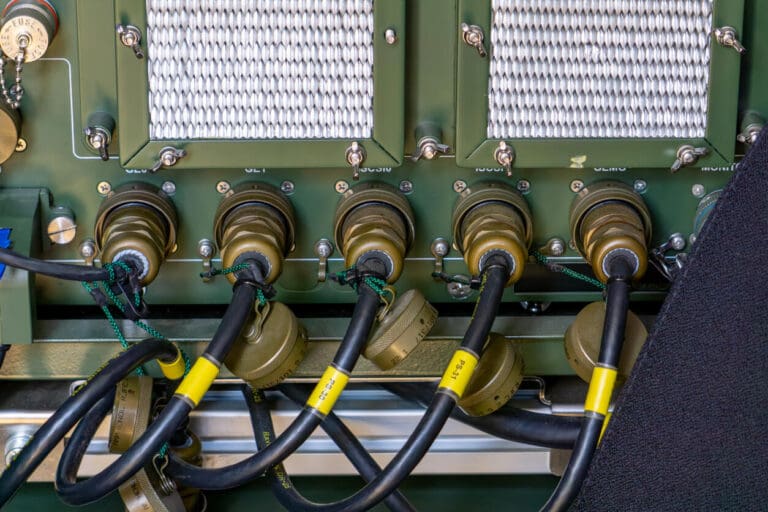
What Does JOSCAR Certification Mean for a Defence Cable Manufacturer?
When you buy mil-spec cable assemblies for rail projects, you are choosing more than a...
Read More
The increasing complexity of electrical systems across industries has driven the need for more efficient, reliable, and scalable manufacturing processes. Cable assembly manufacturers, in particular, have turned to automation as a solution to meet these demands. Automation is revolutionising the way cable assemblies are produced, ensuring higher precision, faster production times, and improved quality control.
This blog will discuss the key ways automation is shaping the future of cable assembly manufacturing, highlighting the benefits for manufacturers and their clients.
Automation has become a cornerstone of modern cable assembly manufacturing, allowing manufacturers to streamline production processes and increase efficiency. Traditional, manual assembly methods can be time-consuming and prone to human error, particularly in complex applications requiring a large number of components. Automated systems can complete tasks more quickly, accurately, and consistently, reducing the time needed to produce cable assemblies.
Automated processes, such as wire cutting, stripping, and crimping, allow for greater consistency and precision, especially in large-scale production. By reducing the potential for errors, manufacturers can ensure that the final products meet strict quality standards, while also speeding up production times to meet increasing demand.
One of the most significant advantages of automation in cable assembly manufacturing is the precision it offers. As industries demand increasingly sophisticated electrical systems, there is little room for error when it comes to cable assemblies. Automated machinery ensures that every wire is cut, stripped, and terminated to exact specifications, minimising the risk of faulty connections or improper insulation.
For example, automated crimping machines can apply the precise amount of force needed to secure terminals to wires, ensuring a strong connection. This level of precision is difficult to achieve consistently through manual labour, particularly when working on high-volume projects. As a result, automation reduces the likelihood of costly rework or system failures caused by poor connections.
Although automation is often associated with large-scale production, it also plays a critical role in the production of customised cable assemblies. Automation technology allows manufacturers to switch between different assembly configurations quickly and efficiently, ensuring that custom orders can be fulfilled with the same level of precision and speed as standardised products.
Modern automated systems can be programmed to handle varying wire sizes, connector types, and configurations, allowing cable assembly manufacturers to offer flexible solutions that meet the specific needs of different industries. Whether it’s for the automotive, medical, or aerospace sector, automation enables manufacturers to adapt to unique project requirements without sacrificing efficiency or quality.
Automation not only speeds up the production process but also enhances quality control in cable assembly manufacturing. Automated systems are equipped with advanced sensors and monitoring tools that allow for real-time inspections of each assembly. These tools can detect defects, such as faulty connections or incorrect wire lengths, before the product reaches the final inspection stage.
By identifying and addressing potential issues early in the manufacturing process, automated systems reduce the risk of defective products reaching the client. This leads to higher levels of customer satisfaction and reduces the time and resources needed for rework or repairs.
Incorporating automation into the cable assembly manufacturing process can significantly reduce labour costs. Automated systems can handle repetitive tasks more efficiently than human workers, allowing manufacturers to allocate their workforce to more complex and value-added activities. This not only helps to lower production costs but also improves scalability, as manufacturers can quickly ramp up production to meet growing demand without requiring additional labour.
For industries that rely on large quantities of cable assemblies, such as telecommunications and data centres, the ability to scale production efficiently is essential. Automation provides manufacturers with the capacity to handle high-volume orders without compromising on quality or delivery times.
Many industries, particularly those with safety-critical applications like automotive and aerospace, require cable assemblies to meet stringent regulatory standards. Automation helps manufacturers ensure compliance with these standards by maintaining consistent quality throughout the production process. Automated systems can be programmed to follow precise guidelines for wire termination, insulation, and testing, ensuring that each product meets the required specifications.
By automating quality control measures, manufacturers can also provide detailed documentation and traceability for each assembly. This is particularly important in industries where regulatory audits are common, as it provides assurance that the products meet the necessary safety and performance standards.
As industries continue to evolve and demand more advanced electrical systems, the role of automation in cable assembly manufacturing will only grow. By streamlining production, enhancing precision, supporting customisation, and improving quality control, automation is helping cable assembly manufacturers meet the increasing complexity of modern systems.
At Gem Cable, we recognise the importance of staying at the forefront of technological advancements in manufacturing. Our commitment to automation allows us to deliver high-quality, reliable, and customised cable assemblies that meet the specific needs of our clients. If you’re looking for a cable assembly manufacturer that can provide scalable solutions with unmatched precision, get in touch with us to learn how we can support your next project.

When you buy mil-spec cable assemblies for rail projects, you are choosing more than a...
Read More
In practice, defence standard cable solves a large share of wiring-driven reliability issues in modern...
Read More
Unmanned systems now underpin many defence programmes, with air, land and maritime platforms providing surveillance,...
Read MoreReady to talk cables, fibre or full network solutions? Get in touch with our team today, we’re here to help.